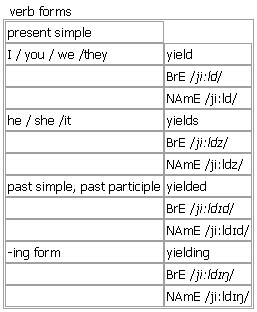 yield
yield
yield [yield yields yielded yielding] verb, noun BrE [jiːld] NAmE [jiːld]
verb
1. transitive ~ sth to produce or provide sth, for example a profit, result or crop
•Higher-rate deposit accounts yield good returns.
•The research has yielded useful information.
•trees that no longer yield fruit
2. intransitive (formal)to stop resisting sth/sb; to agree to do sth that you do not want to do
Syn: ↑give way
•After a long siege, the town was forced to yield.
•~ to sth/sb He reluctantly yielded to their demands.
•I yielded to temptation and had a chocolate bar.
3. transitive ~ sth/sb (up) (to sb) (formal)to allow sb to win, have or take control of sth that has been yours until now
Syn: ↑surrender
•He refused to yield up his gun.
• (figurative)The universe is slowly yielding up its secrets.
4. intransitive to move, bend or break because of pressure
•Despite our attempts to break it, the lock would not yield.
5. intransitive ~ (to sb/sth) (NAmE, IrishE)to allow vehicles on a bigger road to go first
Syn: ↑give way
•Yield to oncoming traffic.
•a yield sign
Verb forms: 
Word Origin:
Old English g(i)eldan ‘pay, repay’, of Germanic origin. The senses ‘produce, bear’ and ‘surrender’ arose in Middle English.
Example Bank:
•He finally yielded to her demands.
•The project is expected to yield good returns in future.
•They refused to yield to public pressure.
•archaeological remains which are yielding up secrets from long ago
•These trees no longer yield fruit.
Derived: ↑yield to something
noun countable, uncountable
the total amount of crops, profits, etc. that are produced
•a high crop yield
•a reduction in milk yield
•This will give a yield of 10% on your investment.
Word Origin:
Old English g(i)eldan ‘pay, repay’, of Germanic origin. The senses ‘produce, bear’ and ‘surrender’ arose in Middle English.
Example Bank:
•This method of cultivation produces higher yield.
•Yields are quite poor this year.
•savings products which offer high yields
•This will give a yield of 10% on your investment.
|
|
